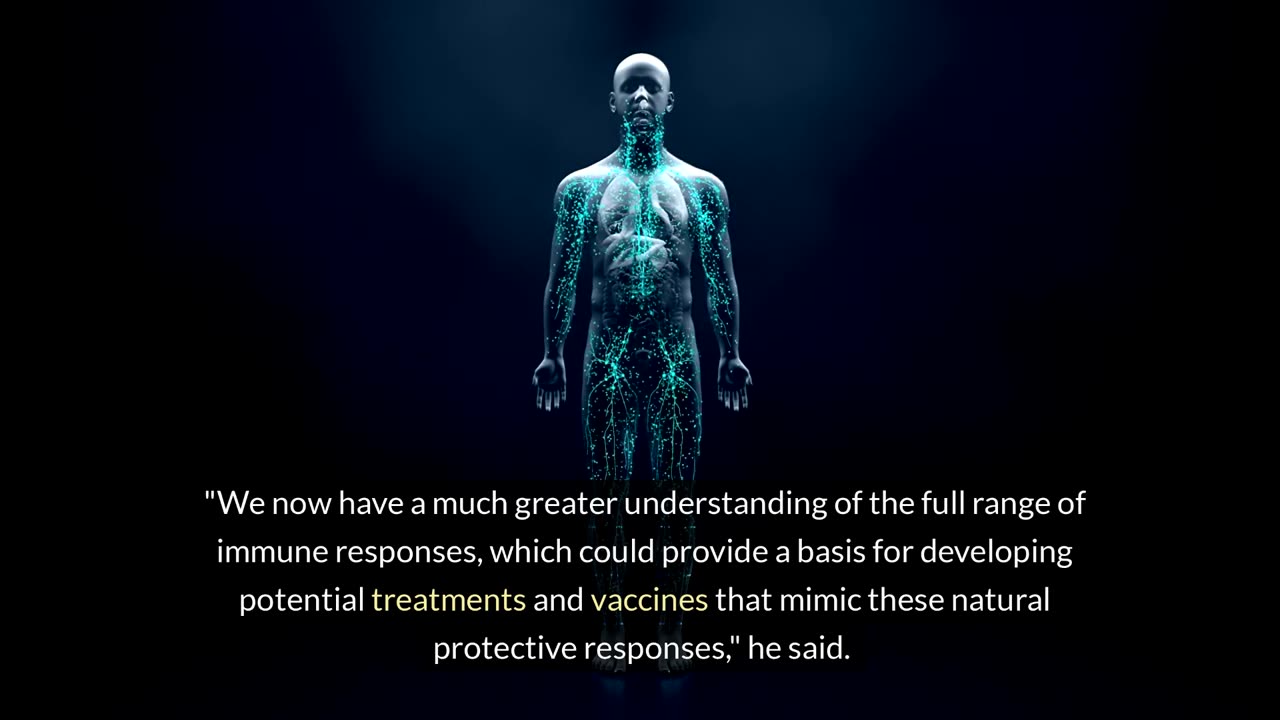Premium Only Content

World-First Experiment Reveals Why Some People Never Get COVID-19
Introduction: The Curious Case of the COVID-Resistant
Imagine living through a global pandemic, surrounded by friends, family, and colleagues who have all had bouts with COVID-19, yet you never even get a sniffle. It sounds almost mythical, but for a small number of people, it's a reality. A groundbreaking experiment by researchers from the Wellcome Sanger Institute and University College London has uncovered the fascinating reasons behind this phenomenon. This discovery not only sheds light on why some people never contract COVID-19 but also opens up new avenues for treatment and prevention strategies that could benefit us all.
## The Challenge Trial: Deliberately Getting Infected
### Setting the Stage
To crack the mystery of COVID resistance, researchers turned to an extraordinary method known as a challenge trial. In this carefully controlled experiment, 36 healthy volunteers aged 18 to 30 were intentionally infected with a pre-Alpha strain of SARS-CoV-2. This approach allowed scientists to monitor and analyze the exact moment of infection and subsequent immune response without the usual variables that complicate field studies.
### The Unique Opportunity
Rik Lindeboom, a quantitative systems biologist involved in the study, highlighted the significance of this approach. "This was an incredibly unique opportunity to see what immune responses look like in adults with no prior history of COVID-19," he explained. The controlled setting ensured that factors such as time of infection and comorbidities could be meticulously managed, providing a clear picture of the immune response in action.
## Unraveling the Immune Response: Blood and Nasal Swabs
### Single-Cell RNA Sequencing
Over the course of a year, blood and nasal swabs were taken from the volunteers and analyzed using single-cell RNA sequencing. This technology allowed researchers to examine the activity of hundreds of thousands of individual cells in unprecedented detail, creating a timeline of immune responses.
### Three Categories of Infection
The data revealed three distinct categories of infection: transient, sustained, and abortive. It was the abortive group—those whose bodies cleared the virus before it could establish a foothold—that intrigued researchers the most. These individuals exhibited a unique immune response that seemed to provide a robust defense against COVID-19.
## The Body's Secret Weapon: MAIT Cells and HLA-DQA2
### Rapid Nasal Response
In the abortive group, researchers discovered a faster and more subtle immune reaction occurring in the nasal tissues rather than the blood. This included the activation of mucosal-associated invariant T (MAIT) cells and a reduction in inflammatory white blood cells. This early response effectively cleared the virus before it could cause symptoms.
### Genetic Factors
Moreover, these individuals displayed elevated expression of the gene HLA-DQA2 in their nasal cells even before being inoculated. This gene, among others, has been linked to mild or symptomless SARS-CoV-2 infections, suggesting a genetic predisposition to resisting the virus.
## Implications for Treatments and Vaccines
### Mimicking Natural Defenses
Senior study author Marko Nikolić emphasized the potential applications of these findings. "We now have a much greater understanding of the full range of immune responses, which could provide a basis for developing potential treatments and vaccines that mimic these natural protective responses," he said. By leveraging the body's natural defenses, we could create more effective strategies to combat COVID-19 and other viral threats.
### Public Health Impact
While vaccines have drastically reduced the risk of severe illness and death from COVID-19, they do not entirely prevent infection. Understanding and replicating the immune mechanisms of those who are naturally resistant could lead to the development of vaccines and treatments that provide more comprehensive protection.
## The Future of Pandemic Preparedness
### Learning from the Resistant Few
The insights gained from this study are not just relevant to COVID-19 but also to our broader understanding of viral infections and immune responses. By studying the body's natural defenses, we can better prepare for future pandemics and potentially develop universal vaccines that offer protection against a wide range of pathogens.
### The Path Ahead
Researchers are now focused on translating these findings into practical applications. This includes developing antibody drugs that could provide immediate protection for those at high risk and refining vaccine formulations to enhance their efficacy. The goal is to begin testing these new treatments in clinical trials within the next few years.
## Conclusion: A New Hope in the Fight Against Viruses
The discovery of why some people never get COVID-19 offers a beacon of hope in our ongoing battle against the virus. By understanding and harnessing these natural immune responses, we can develop better treatments and preventive measures, ultimately leading to a healthier, more resilient global population.
If you found this article insightful, please like, share, and subscribe to our channel. Don't forget to leave a comment below with your thoughts and questions. Let's continue to stay informed and support each other as we navigate these challenging times together.
-
 LIVE
LIVE
Nikko Ortiz
19 minutes agoLive - News, Politics, Podcast And Naaah Im Playin We Chillen
197 watching -
 LIVE
LIVE
Law&Crime
1 hour ago $0.24 earnedLIVE: Wife Dismembered Murder Trial – GA v. Nicholas Kassotis – Day 6
203 watching -
 LIVE
LIVE
JuicyJohns
1 hour ago $0.59 earned#1 REBIRTH ISLAND CONTENT 10+ KD | !loadout !300
98 watching -
 1:31:32
1:31:32
Dear America
1 hour agoLibs SEETH Over Trump Federalizing DC! They’re Protesting Ending Crime…
84.7K72 -
 LIVE
LIVE
Badlands Media
10 hours agoBadlands Daily: August 12, 2025
3,957 watching -
 LIVE
LIVE
Matt Kohrs
10 hours agoNew Highs Incoming: CPI Inflation Report SKYROCKETS 🚀🚀🚀 || LIVE! Trading
788 watching -
 41:44
41:44
SGT Report
14 hours agoTHE SYSTEM IS BEING RESET RIGHT BEFORE YOUR EYES -- Collin Plume
22.8K20 -
 LIVE
LIVE
The Mike Schwartz Show
1 hour agoTHE MIKE SCHWARTZ SHOW with DR. MICHAEL J SCHWARTZ 08-12-2025
4,157 watching -
 LIVE
LIVE
LFA TV
11 hours agoLFA TV ALL DAY STREAM - TUESDAY 8/12/25
4,798 watching -
 1:35:36
1:35:36
Chicks On The Right
5 hours agoInsane rightwing infighting and drama, Trump's presser on DC, freakout over death of "journalist"
26.1K5